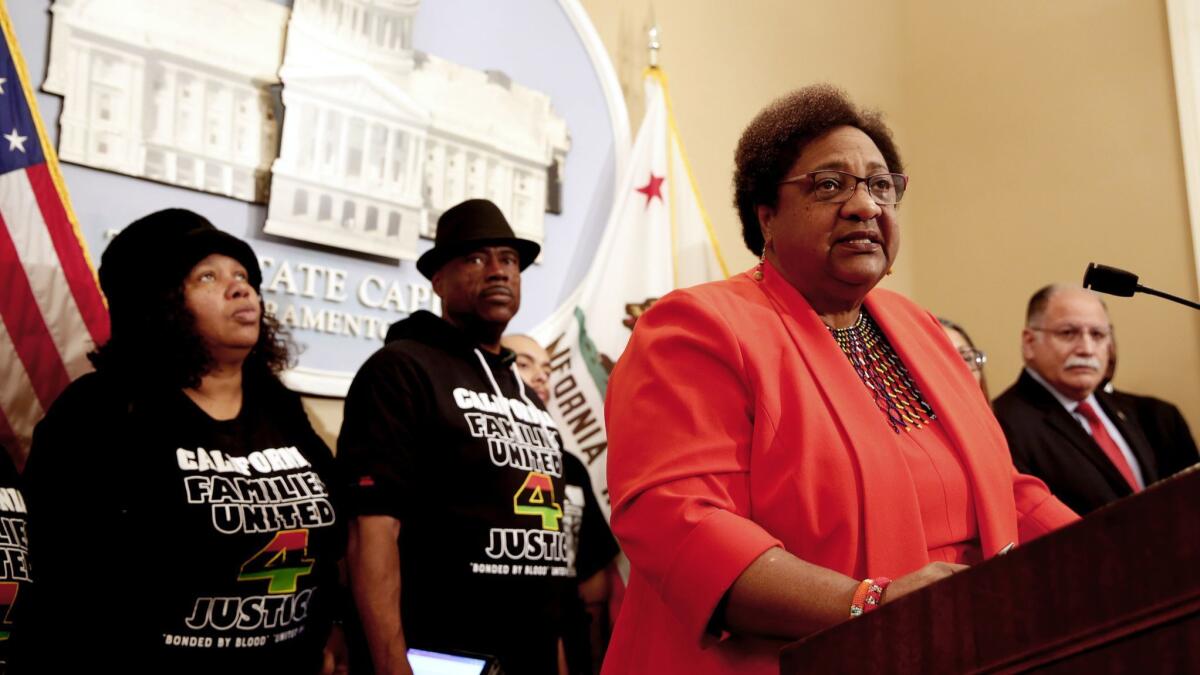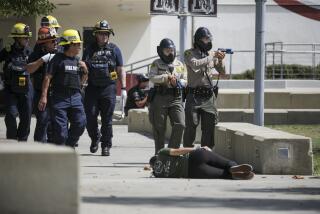California police use-of-force bill advances after Black Lives Matter, families drop support

Reporting from SACRAMENTO â By an overwhelming majority, the state Assembly on Wednesday passed a police use-of-force bill that could give California one of the toughest standards in the nation, days after changes pacified law enforcement but caused some of the billâs earliest supporters to abandon it.
Absent from the Capitol were some Los Angeles and Bay Area families of victims of police shootings who helped propel the legislation to this point with marches, rallies and an emotional and pervasive presence that kept their loved onesâ names at the forefront of a contentious conversation. While legislators opined about the bill â mostly in support â the half-empty gallery was missing people wearing T-shirts and carrying signs demanding justice. Also absent were the mothers whose grief was often unconstrained and the raw anger that over past months has often broken the staid decorum and helped pressure legislators to acknowledge that the issue was unlikely to disappear.
Floor votes seldom draw the crowds of legislative hearings because their timing is less predictable; still, some said they donât plan to return as the bill works through the Senate.
Last week, Black Lives Matter Los Angeles and a Northern California group representing families of victims, Silicon Valley de-bug, pulled their support of the bill, saying in part that its vague new compromise wording will leave courts to sort out its meaning â requiring a test case that would probably involve a lethal encounter. Fifteen of 17 families working with Black Lives Matter L.A. and 11 families in the Bay Area said they couldnât support legislation they viewed as failing to prevent deaths, according to representatives from the two groups.
âAnother person is going to have to die before we can prove that this bill is not going to do what you think itâs going to do,â said Laurie Valdez, whose partner, Antonio Guzman Lopez, was shot by San Jose State police in 2014, and who has been a fixture at the Capitol fighting in favor of AB 392. âItâs like a slap in our face.â
Cephus Johnson, uncle of Oscar Grant, who was shot by a Bay Area Rapid Transit officer in Oakland in 2009, said there are five organizations still co-sponsoring the bill that work directly with families of victims, representing âhundredsâ of supporters.
Stevante Clark, a member of Johnsonâs group whose brother, Stephon Clark, became a rallying point for the legislation after he was killed by Sacramento police in 2018, said the bill was âa little watered-down with the changes that were made, but at the same time this is progress.â
âSlow progress is better than no progress,â Clark said.
The outrage by some families comes as many inside the Legislature frame the measure as a significant change to existing law that, along with a companion proposal, Senate Bill 230, passed unanimously by that house a day earlier, will fundamentally change policing in the state â albeit years from now.
Assembly Bill 392 is supported by the governor and leaders in both houses, suggesting a potential shift for the powerful law enforcement lobby that once could tamp down legislation almost at will. Legislators also praised Assemblywoman Shirley Weber (D-San Diego) for her tenacity on the issue after seeing a similar bill, AB 931, fail last year. The billâs co-author, Assemblyman Kevin McCarty (D-Sacramento), called her âfearlessâ and âdogged,â praise echoed over the long debate.
Weber said her impetus for refusing to back away from the issue was her two young grandsons, Kadir and Jalil. She said sheâs âmade a commitment that I never want to have âthat conversationâ with them,â referring to a common talk African American parents have with children about how to handle police interactions to avoid violence.
âThey believe at this point that they have just as much right and respect as any other child in this nation, and that should never change,â she said.
Weber said the compromise was ultimately what she was after with the bill, and she believed it remained strong with the revisions.
âI kept saying this bill will make it safe behind and in front of the badge,â she said. âMy community deserves the luxury of calling police and knowing life will get better because of it.â
Law enforcement groups initially opposed AB 392 when it sought to upgrade the current standard on deadly force, allowing police to use it only when ânecessary,â as opposed to when it is âreasonable.â In a surprise capitulation, law enforcement groups withdrew their opposition to AB 392 late last week after changes that included removing de-escalation requirements and removing the definition of ânecessaryâ â and after a private meeting with Gov. Gavin Newsom, who has indicated he will sign the legislation.
The bill retained language that could allow broader investigations into uses of lethal force by expanding the timeline that can be examined to include actions leading up to the fatal moment. That, in turn, could encourage increased de-escalation and crisis intervention training, among other skills, though the bill doesnât directly deal with training. Currently, criminal case law set by the U.S. Supreme Court allows only the seconds of the fatal force to be considered in determining whether it was justified, though California civil law allows for broader considerations.
The bill also changes when police can use lethal force on a fleeing felony suspect to bring state law in line with federal case law.
The division between how some activists and politicians viewed Wednesdayâs vote underscores the power of high-profile, media-savvy organizing to capture the attention of legislatures and the divide that often emerges as the reality of a political system based on compromise clashes with the passion of street activists.
Johnson, Grantâs uncle, said he considered himself a âgrandfatherâ of the police reform movement. As such, he said, he had a better understanding of the legislative process than some families with more recent losses. Johnson said he believes those families who have dropped off are facing a âlearning curveâ in politics.
âIn the past 10 years, never have we even come close to what 392 does,â Johnson said. âI believe that as it falls into judgesâ hands for interpretation, into D.A.sâ hands to decide to charge, we will see changes. Itâs that season. Itâs that time.â
Legal experts and some who worked on the bill said there was probably no wording that could both pass into law and keep the bill from ultimately being deciphered by courts.
âThe notion that we would write a law that would not require scrutiny and judicial determination is complete fantasy,â said Robert Weisberg, director of the Stanford Criminal Justice Center.
Mike Rains, a trial lawyer who specializes in law enforcement and represented the officer who shot Grant, said the bill will probably require litigation around its âtotality of circumstancesâ language to determine whether it does crack the door to examining officersâ actions leading up to the use of lethal force.
âThis is the lawyersâ full-employment act,â Rains said. âThis âtotality of circumstancesâ is scary to me because it doesnât clearly say they are going to consider pre-shooting tactics, so I donât know. That to me is really an ambiguity.â
David E. Mastagni, a Sacramento-based lawyer who worked on the bill and represents police and other labor unions, said that although the law was imperfect, he believed that it, combined with SB 230, could significantly change how police are trained in California and create more uniform policies. Departments largely make their own use-of-force rules because of the loose law.
âYou really have to look at this package of legislation,â Mastagni said. SB 230 âis going to result in better outcomes from everybody because itâs going to mandate better training and higher standards of policies statewide.â
But Mastagni and others said retraining all officers will take time, both to create the standards and funnel them through classes. The state had about 80,000 sworn officers in 2017, according to the Public Policy Institute of California. AB 392 will probably be amended in the Senate, where it moves next, to delay its implementation until that training can be completed, a process that could take years.
Valdez, whose partner was killed in San Jose, said she is disappointed, mostly for her 9-year-old son, Josiah, that her months of advocacy have ended without the bill she wanted. A few days ago, Josiah found video on YouTube of his father being shot because he âjust wanted to see my dad back alive,â he told Valdez. But it traumatized him and has left Valdez unable to sleep.
âIâve been fighting so hard,â she said. âIt just hurts.â
More to Read
Get the L.A. Times Politics newsletter
Deeply reported insights into legislation, politics and policy from Sacramento, Washington and beyond. In your inbox three times per week.
You may occasionally receive promotional content from the Los Angeles Times.











